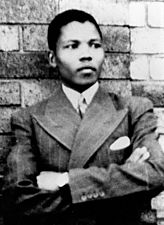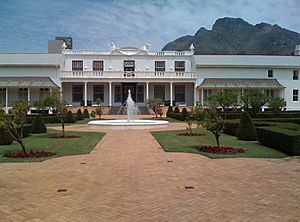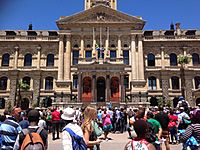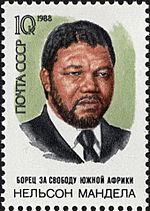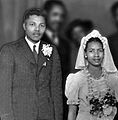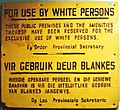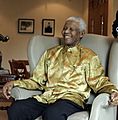Nelson Mandela facts for kids
Quick facts for kids
His Excellency
Nelson Mandela
|
|
|---|---|
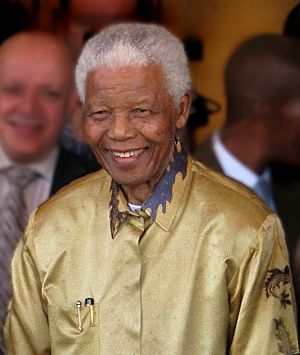
Mandela in May 2008
|
|
| 1st President of South Africa | |
| In office May 10, 1994 – June 14, 1999 |
|
| Deputy | Thabo Mbeki F. W. de Klerk |
| Preceded by | F. W. de Klerk |
| Succeeded by | Thabo Mbeki |
| Secretary General of Non-Aligned Movement | |
| In office September 2, 1998 – June 14, 1999 |
|
| Preceded by | Andrés Pastrana Arango |
| Succeeded by | Thabo Mbeki |
| Personal details | |
| Born |
Nelson Rolihlahla Mandela
July 18, 1918 Mvezo, Umtata (now Mthatha), South Africa |
| Died | December 5, 2013 (aged 95) Johannesburg, South Africa |
| Political party | African National Congress |
| Spouses | Evelyn Ntoko Mase (1944–1957) Winnie Madikizela (1957–1996) Graça Machel (1998–2013) |
| Children | Madiba Thembekile Makgatho Lewanika Makaziwe Maki Zenani Zindziswa |
| Residences | Houghton Estate, Johannesburg, South Africa |
| Alma mater | University of Fort Hare University of London External System University of South Africa University of the Witwatersrand |
| Signature |  |
Nelson Rolihlahla Mandela (July 18, 1918 – December 5, 2013) was a South African politician and activist. On April 27, 1994, he was made the first President of South Africa, elected in an election in which everyone was allowed to vote. Mandela was also the first black President of South Africa.
Contents
Early life
Nelson Rolihlahla Mandela was born on July 18, 1918, in Mvezo, South Africa, to a Thembu royal family. He had thirteen siblings by the same father and two mothers. His given name was Rolihlahla, a Xhosa name meaning pulling the branch of a tree or troublemaker.
His father, Gadla Henry Mphakanyiswa, died when Nelson was twelve. Mandela was sent to live with a local regent, who sent him to school. Mandela was the first member of his family to go to school. His teacher, Miss Mdingane, gave him the name Nelson.
Later, he was expelled from Fort Hare University in 1941, because he led a group of students on political strike. After he was expelled, Nelson found a job as a night watchman.
Anti-apartheid activity
In 1944, Mandela helped start the African National Congress Youth League, a part of the African National Congress (ANC) for younger people. He was soon a high-ranked leader of the group.
Mandela's goal was to end apartheid. At first, Mandela tried to bring equality peacefully, but in 1961, he began an armed branch of the ANC called Umkhonto we Sizwe (Spear of the Nation) with Walter Sisulu and other people in the African National Congress whom he admired. He hid from the South African government and planned to bomb buildings. The South American government found him and sentenced him to life in prison. He was sent to Robben Island and later transferred to other prisons.
In 1990, South African president Frederik Willem de Klerk ordered Mandela's release from prison. In 1991, Mandela became president of the ANC and worked with de Klerk to end apartheid more peacefully.
Presidency
In 1994, all races were allowed to vote in the general election. Mandela became the first South African President elected in a completely democratic election. His government focused on working to end racism, poverty, and inequality in South Africa.
Mandela became known for his use of Batik shirts, known as Madiba shirts, even during normal events. He lived simply, donating a third of his $552,000 wealth to the Nelson Mandela Children's Fund, which he had founded in 1995. In that same year, Mandela published his autobiography, Long Walk to Freedom.
Mandela had never planned on serving a second term in office. He gave his farewell speech on March 29, 1999, announcing his retirement. Mandela's term ended on June 14, 1999. Thabo Mbeki succeeded him as President of South Africa.
Public retirement
In June 2004, Mandela announced his retirement from public life. Mandela said, "Don't call me, I will call you." He no longer went to public events and did very few interviews.
Illness and death
Mandela was ill for several years during his retirement. He was hospitalized in the late summer of 2013 from a continuous lung infection. Mandela died on December 5, 2013, in Houghton Estate, Johannesburg, from a respiratory tract infection. He was 95 years old.
Mandela's body lay in state from December 11 to 13 at the Union Buildings in Pretoria. A state funeral was held on Sunday, December 15, 2013, in Qunu in the Eastern Cape of South Africa, where Mandela grew up. David Cameron, Barack Obama, Raul Castro, Bill Gates, and Oprah Winfrey were there. Mandela was buried in the village of Qunu.
Queen Elizabeth II honored Mandela with a thanksgiving service at Westminster Abbey in early 2014. This made Mandela the first non-British person to be honored at Westminster Abbey.
Personal life
Mandela married Evelyn Ntoko Mase in October 1944. They had four children. Mandela remained married to Evelyn until they divorced in 1957. He then married Winnie Madikizela in 1958. They had two daughters. The couple filed for separation in 1992. They divorced in 1996. He then married Graça Machel in 1998. They remained married until Mandela died in 2013.
Honors
Mandela received more than 250 honors, including the 1993 Nobel Peace Prize, the US Presidential Medal of Freedom, and the Soviet Order of Lenin. He is often referred to by his Xhosa clan name, Madiba, or as Tata ("Father"). Mandela was described as a hero, and his actions gave thousands of people hope. The following is a list of some of his honors:
- In 1990, Mandela received the Bharat Ratna Award in India.
- In 1992, received Pakistan's Nishan-e-Pakistan.
- In 1992, he was awarded the Atatürk Peace Award by Turkey. He refused the award, because of human rights violations committed by Turkey at the time. He later accepted the award in 1999.
- In 1993, Mandela won the Nobel Peace Prize with F. W. de Klerk for their work during the civil rights revolution in South Africa.
- In 1993, Mandela received the key to the city of Chicago, Illinois, from Mayor Richard M. Daley.
- In 2007, Mandela was honored with a statue in Westminster Abbey, London, England.
- In 2009, the United Nations made July 18 Mandela Day.
- In 2012, the Praia International Airport in Cape Verde was renamed as the Nelson Mandela International Airport.
- In 2013, a statue of Mandela was unveiled in the South African embassy outside of Washington, D.C..
- The city of Johannesburg awarded him Freedom of the City.
- Sandton Square in Johannesburg was renamed Nelson Mandela Square in March 2004.
- The Nelson Mandela Bay Stadium was named in his honor.
- The Nelson Mandela Bridge, in Johannesburg was also named in his honor.
- Mandela was awarded the US Presidential Medal of Freedom by then-President of the United States George W. Bush.
- Mandela was awarded the Order of Canada.
- Mandela was the first living person made an honorary Canadian citizen.
- Mandela was the last recipient of the Soviet Union's Lenin Peace Prize from the Soviet Union.
- Mandela first recipient of the Al-Gaddafi International Prize for Human Rights
- Mandela was honored with the Order of the Aztec Eagle by the Mexican government.
- A park in Leicester, England was named Nelson Mandela Park was named after Mandela.
- A major highway and a busy park in the Kingston Metropolitan Region in Jamaica were named after Nelson Mandela, the "Mandela Highway" and "Mandela Park."
- Elizabeth II awarded him the Bailiff Grand Cross of the Order of St John.
- Mandela was also awarded the Order of Merit by Elizabeth II.
Movies
Mandela has been portrayed in movies and television. In the 1997 movie, Mandela and de Klerk, Sidney Poitier plays Mandela. Dennis Haysbert plays Mandela in Goodbye Bafana (2007). In the 2009 BBC television movie, Mrs Mandela, Nelson Mandela is played by David Harewood. In 2009, Morgan Freeman plays Mandela in Invictus (2009). Terrence Howard also plays Mandela in the 2011 movie Winnie Mandela. Mandela appeared as himself in the 1992 movie Malcolm X. In Mandela: Long Walk to Freedom he was played by Idris Elba.
Legacy
By the time of his death, many people considered Mandela as "the father of the nation" within South Africa.
Throughout his life, Mandela had also faced criticism. Margaret Thatcher described the ANC as "a typical terrorist organization" in 1987. Mandela has also been criticized for his friendship with political leaders such as Fidel Castro, Muammar Gaddafi, Akbar Hashemi Rafsanjani, and Suharto.
Nelson Mandela quotes
- "It always seems impossible until it's done."
- "Do not judge me by my successes, judge me by how many times I fell down and got back up again."
- "Everyone can rise above their circumstances and achieve success if they are dedicated to and passionate about what they do."
- "Resentment is like drinking poison and then hoping it will kill your enemies."
Interesting facts about Nelson Mandela
- Mandela received military training in Ethiopia in 1962.
- July 18th is Nelson Mandela day. People are asked to devote 67 minutes to helping others. The 67 minutes represents the 67 years Mandela spent serving his country.
- Nelson was arrested for treason – the crime of betraying your country’s government – several times.
- In order to leave the country (which he was banned from doing), he used the name David Motsamayi to get out of South Africa in secret.
- In Robben Island, Mandela’s prison number was 46664. He was the 466th prisoner in 1964.
- He used his time in prison to learn new things, including Afrikaans.
- Mandela enrolled in the University of London’s correspondence program and received a Bachelor of Law degree, also while he was in prison.
- Mandela loved sports and believed that it “has the power to change the world… it has the power to inspire. It has the power to unite people in a way that little else does."
- Mandela was an honorary citizen of many countries, including Canada, the United States, and Brazil.
Related pages
Images for kids
-
Mandela's former home in the Johannesburg township of Soweto
-
Bust of Mandela erected on London's South Bank by the Greater London Council administration of Ken Livingstone in 1985
-
"Free Mandela" protest in East Berlin, 1986
-
De Klerk and Mandela at the World Economic Forum, 1992
-
Mandela casting his vote in the 1994 election
-
Mandela with US president Bill Clinton. Despite publicly criticizing him on several occasions, Mandela liked Clinton, and personally supported him during his impeachment proceedings.
-
Mandela visiting the London School of Economics in 2000
-
Nelson Mandela and President George W. Bush in the Oval Office, May 2005
See also
 In Spanish: Nelson Mandela para niños
In Spanish: Nelson Mandela para niños


